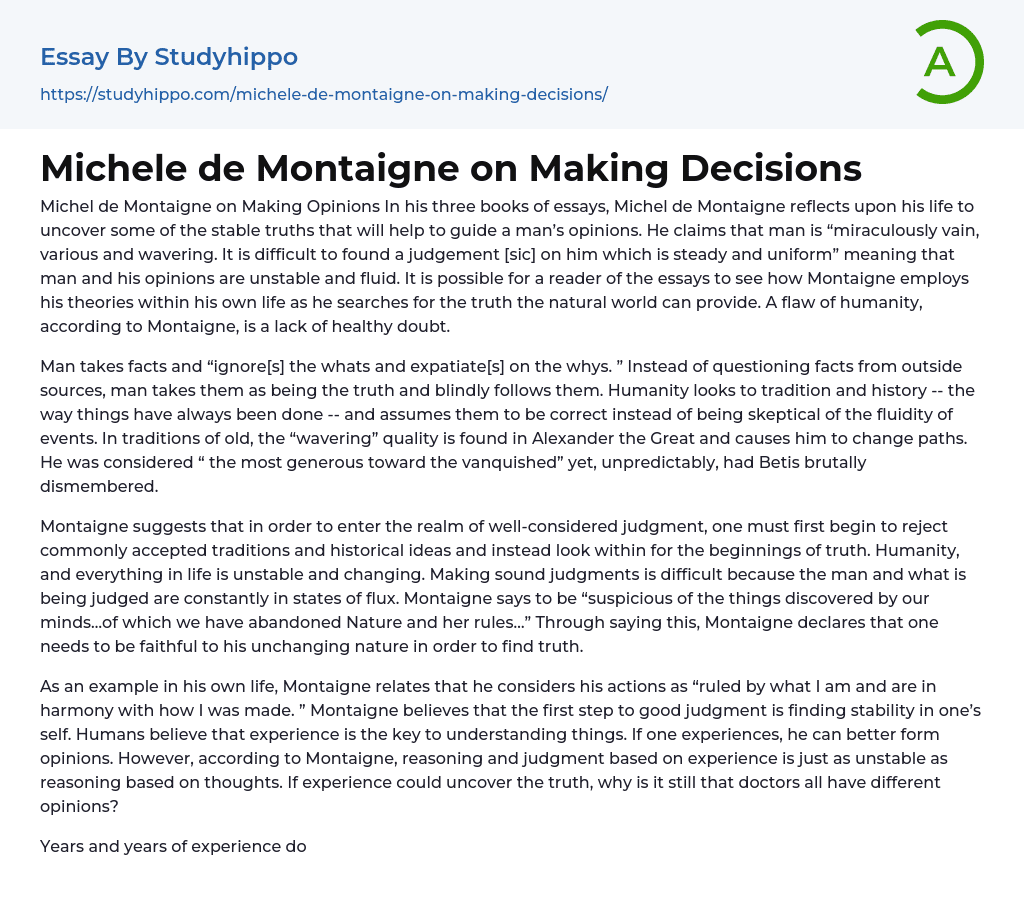In his three books of essays, Michel de Montaigne ponders on the process of forming opinions. He believes that mankind is inherently self-absorbed, diverse, and fickle. This implies that individuals and their opinions lack stability and consistency. By examining his own life, Montaigne illustrates how he applies his theories in the pursuit of discovering truths from nature. According to Montaigne, a flaw in human nature is the absence of beneficial skepticism.
The text suggests that instead of questioning facts from external sources, man tends to accept them as true and unquestioningly adhere to them. Humanity often relies on tradition and history, assuming that the way things have always been done is the right way, without questioning the ever-changing nature of events. This idea of wavering can be seen in the example of Alexander the Great, who was known for his generosity
...towards the defeated but unexpectedly ordered Betis to be brutally dismembered.
Montaigne proposes that to achieve thoughtful judgment, one must first challenge common traditions and historical ideas, and instead search inward for truth. Both humanity and life undergo continuous change and instability. The difficulty of making sound judgments arises from the perpetual flux of both the individual and the object being evaluated. Montaigne cautions against placing blind trust in ideas conceived by our minds, which deviate from and disregard natural principles. Through this assertion, Montaigne asserts the necessity of remaining loyal to one's unchanging nature in the pursuit of truth.
In his own life, Montaigne gives an example of how he views his actions as being influenced by his nature and in alignment with his true self. He stresses the importanc
of finding stability within oneself as the first step toward good judgment. People generally believe that experience is crucial for understanding things, as it allows them to form opinions more effectively. However, Montaigne argues that reasoning and judgment based solely on experience are just as unreliable as those based on mere thoughts. He asks why doctors, who should have sufficient experience, still hold different opinions if experience truly uncovers the truth.
Despite their extensive experience, doctors are unable to reach a consensus, suggesting that years of practice do not enhance their authority. Montaigne's perspective implies that well-founded opinions arise from a pursuit of truth in various aspects of life. This quest for truth demands individuals to adopt a skeptical mindset towards everything and prioritize the power of nature over the scientific and scholarly "truth" by focusing on the immutable nature of humanity rather than constant fluctuations.
In addition to experiencing things, man must examine them skeptically and reject conventional ideas and traditions. He must also look inward and observe nature to uncover the truth in all aspects of life. To attain stability, man needs to develop an inner understanding of himself. Certainty can only be obtained by discovering stable truths, which can only be achieved by questioning everything and doubting all things. This doubt enables constant awareness of the ever-changing world.
In Montaigne's essays, his experiences demonstrate the effects of "healthy skepticism" in his continuous contemplation of life. Through questioning everything subject to change, Montaigne is able to make well-founded judgments. He embraces a life of skepticism and reflection, viewing it as a significant and comprehensive endeavor that aids him in evaluating
his beliefs. Nevertheless, it is evident that the pursuit of truth is an ongoing journey.
Montaigne asserts that he speaks as a questioning individual, relying solely on the common beliefs of the Church without attempting to demonstrate his achievement of absolute certainty in any other ideology. He illustrates that skepticism is essential for the formation of substantial opinions.
Bibliography de Montaigne, Michel, The Complete Essays. Translated by M. A. Screech. London, England: Penguin Books Ltd., 1987. -------------------------------------------- [ 1 ].
Michel de Montaigne discusses various topics in his essays. In his essay "We Reach the Same Ends by Discrepant Means," he explores the idea that different methods can lead to the same outcome [2]. In "On the Lame," Montaigne provides further insights [3]. Additionally, he delves into the topic of children resembling their fathers in "On the Resemblance of Children to Their Fathers" [4]. Montaigne also reflects on the concept of repenting in his essay titled "On Repenting" [5]. Furthermore, he highlights the importance of social interaction in "On Three Kinds of Social Intercourse" [8]. Through his essays, Montaigne offers a diverse range of perspectives on these various subjects [6][7][9].
- Improve essays
- Awareness essays
- Trust essays
- Farewell essays
- Visit essays
- Accident essays
- Driving essays
- Volunteering essays
- Excellence essays
- Knowledge essays
- Ignorance essays
- Growing Up essays
- Mistake essays
- Failure essays
- Peace Corps essays
- Expectations essays
- Luck essays
- Challenges essays
- Decision essays
- Sacrifices essays
- Struggle essays
- Vacation essays
- Memories essays
- Event essays
- Gift essays
- Party essays
- Incident essays
- Flight essays
- Obstacles essays
- Problems essays
- Success essays
- Personal Experience essays
- Overcoming Challenges essays
- Benefits of Volunteering essays
- Childhood Memories essays
- Car Accident essays
- Driver essays
- Driving under the Influence essays
- Volunteer Experience essays
- Nightclub essays
- Puritans essays
- Afterlife essays
- Buddhism essays
- Christianity essays
- Deism essays
- Faith essays
- God essays
- Hinduism essays
- Islam essays
- Jews essays




